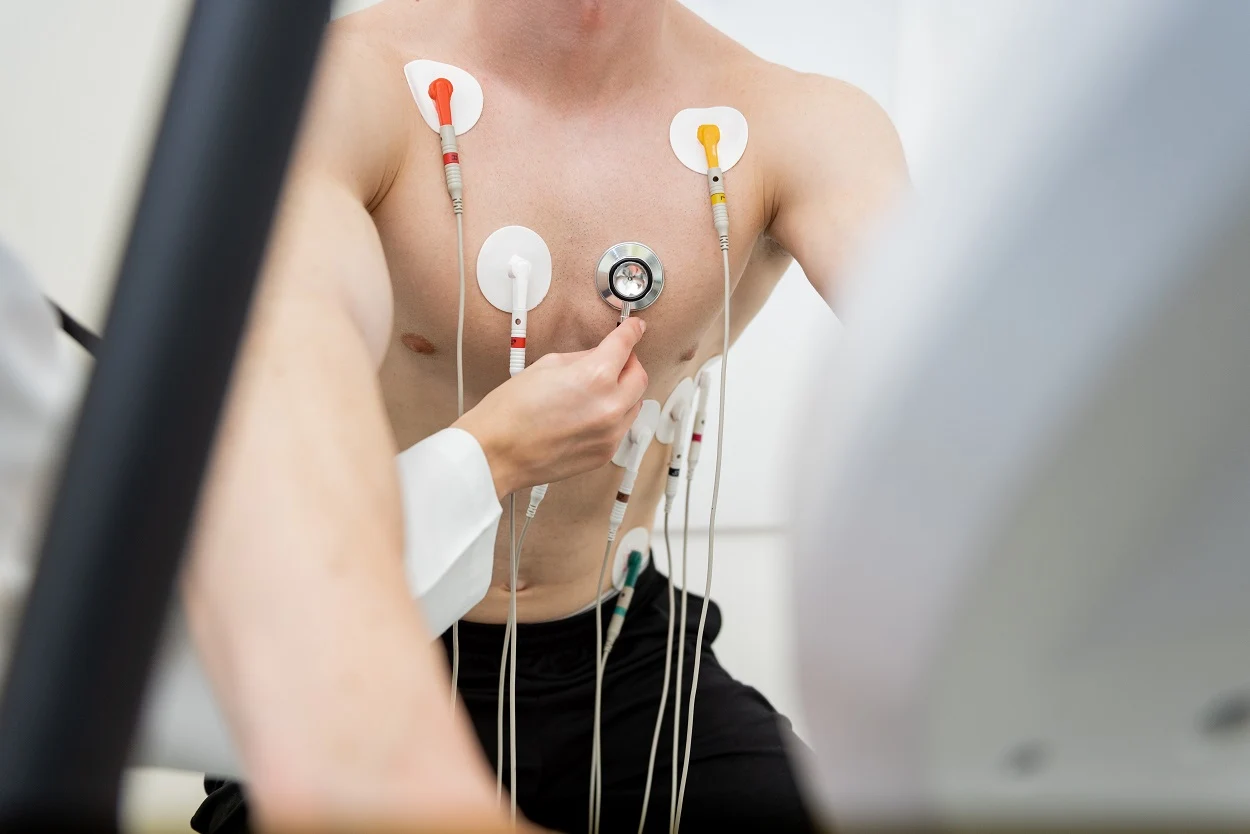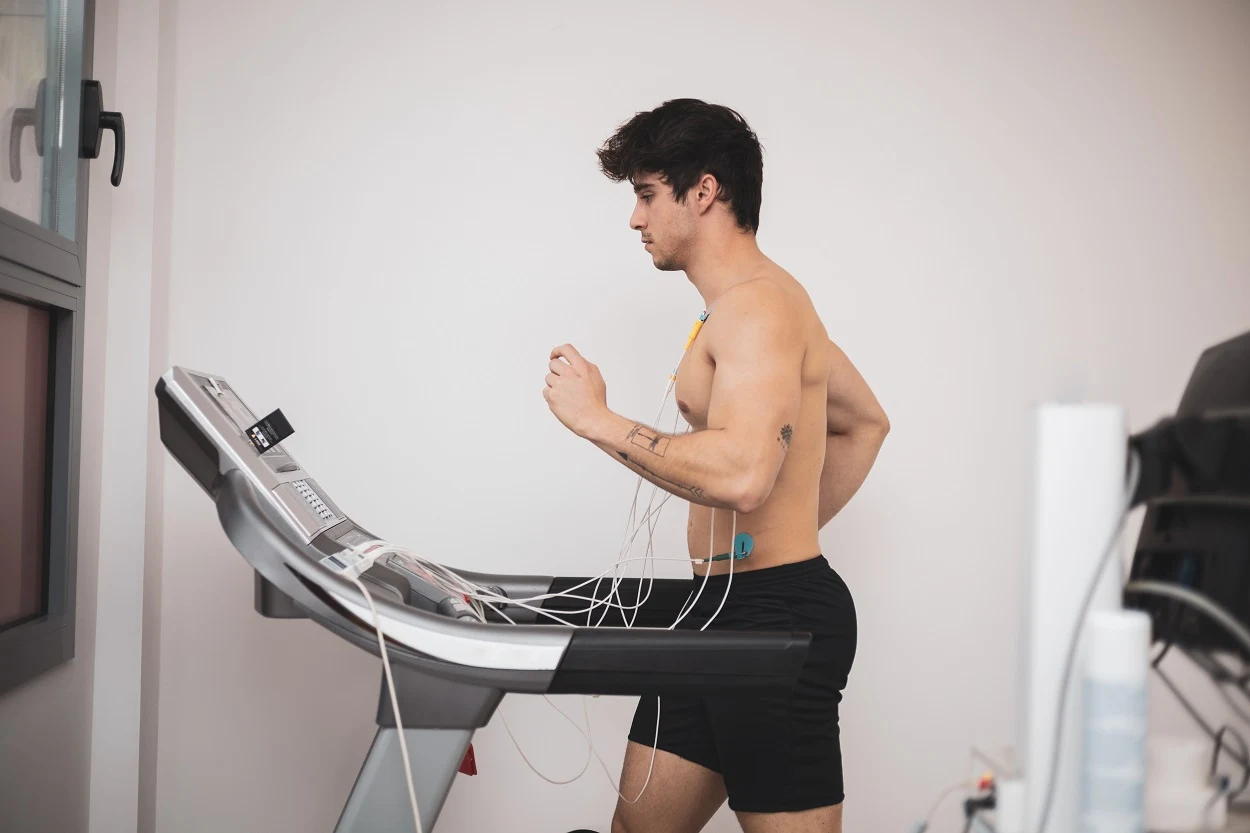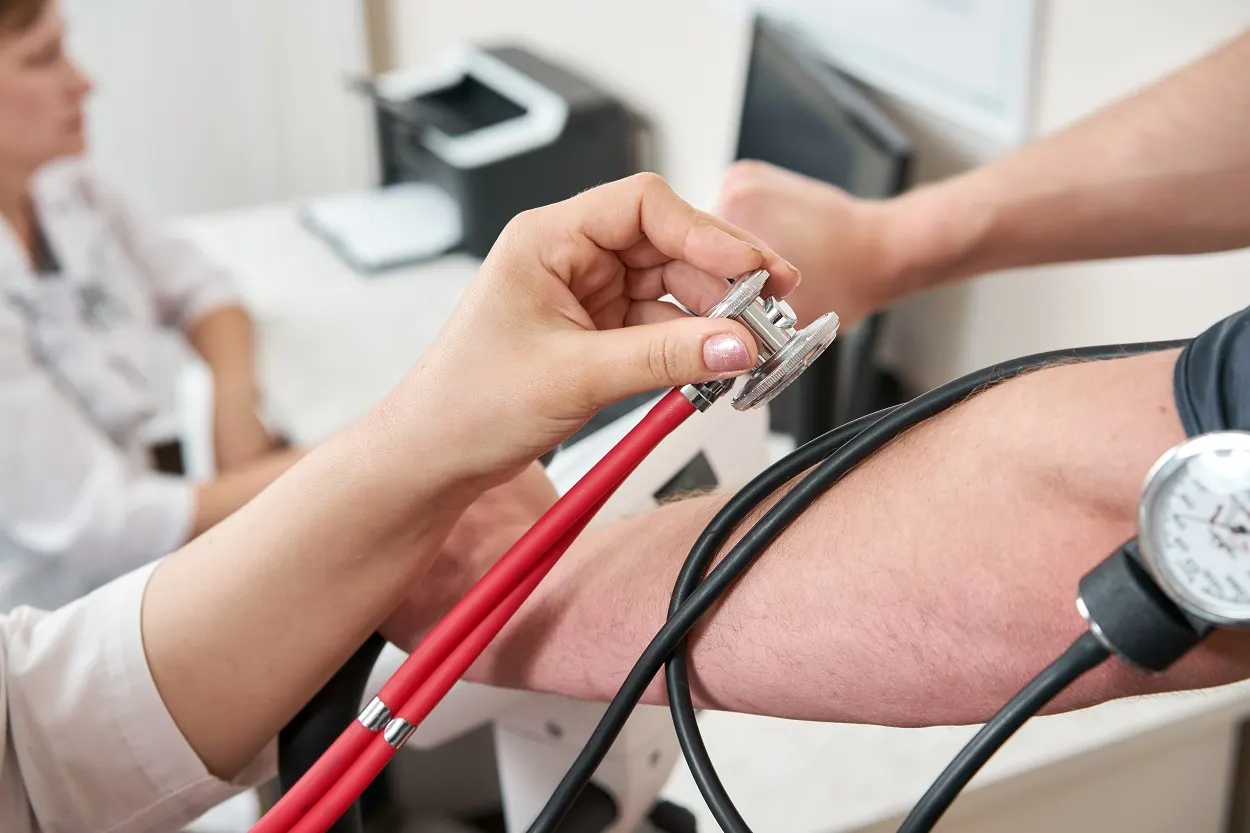Stress Tests
Cardiocare’s doctors and cardiovascular technicians conduct a range of cardiac stress testing including treadmill stress tests, stress echos, nuclear stress tests, and dobutamine stress echos. With the expertise of our cardiac specialists, our patients can be sure of getting the right diagnosis and proper treatment of cardiac conditions.
What Is a Cardiac Stress Test?
A cardiac stress test is a non-invasive procedure that measures your heart’s response to physical activity. It helps doctors evaluate your heart’s health, diagnose coronary artery disease (CAD), and assess your risk for a heart attack.
Why Do I Need a Cardiac Stress Test?

A cardiac stress test can be a valuable tool for understanding your heart health and identifying potential issues.
- Chest Pain: To determine if chest pain is caused by coronary artery disease.
- High Blood Pressure: To assess your heart’s response to physical activity.
- Heart Disease Risk: To evaluate your risk for a heart attack or other heart problems.
- Heart Failure: To evaluate your heart’s ability to pump blood effectively.
- After Heart Surgery: To monitor your recovery and identify any potential complications.
Your doctor will recommend a cardiac stress test if they believe it’s needed based on your individual health history and symptoms.
4 Cardiac Stress Test Types
There are several different types of cardiac stress tests, each designed to assess your heart’s health in a slightly different way.
Treadmill Stress Test
For this test, you will be walking and potentially running on a treadmill. In preparation for this test, you will be asked to remove your shirt or wear a gown so we can place stickers on your chest that allow us to watch your heart rhythm as you exercise. Once on the treadmill, you will start off walking at a relatively slow speed at minimal elevation. Every 3 minutes, the treadmill will increase in speed and incline. The amount of time you will be on the treadmill depends on your age and level of fitness. During a treadmill stress test, your cardiologist will be present and will monitor your heart rhythm, blood pressure, and symptoms.
It is recommended that you bring comfortable walking/running shoes and athletic clothing with you for a treadmill stress test. Please discuss with your doctor if you should hold certain medications prior to your stress test.
Stress Echocardiogram
This test is very similar to a treadmill stress test but there is an additional step. A sonographer will take ultrasound pictures of your heart at rest before you exercise on the treadmill and again directly after you finish exercising when your heart rate is elevated.
It is recommended that you bring comfortable walking/running shoes and athletic clothing with you for a stress echocardiogram. Please discuss with your doctor if you should hold certain medications prior to your stress test.
Nuclear Stress Test
At Cardiocare, a nuclear stress test takes place in our office-based, ICANL-certified lab. A nuclear stress test uses radioactive tracers to visualize blood flow to the heart muscle. The rest images and stress images are compared to determine whether there are changes in blood supply and heart function with stress that would suggest blockages in the coronary arteries.
There are two types of nuclear stress tests:
- Exercise Nuclear Stress Test: For this test, we will take pictures of your heart at rest after giving you the first tracer. Then you will walk on the treadmill similar to an exercise treadmill stress test. At your peak exercise capacity, a second tracer will be given and a second set of pictures will be taken.
- Pharmacologic Nuclear Stress Test / Lexi Scan or Regadenoson Stress Test: During this test, we will take pictures of your heart at rest. Then we will give you a medication that simulates the effect of exercise on your coronary arteries as well as the second tracer. A second set of pictures will then be taken. You will not need to exercise for this test.
A nuclear stress test takes about 2 to 3 hours and will require that you have an IV placed in your arm. You will need to fast for this test for at least 8 hours. Please discuss with your doctor if you should hold certain medications prior to your stress test. If you are doing an exercise nuclear stress test it is recommended that you bring comfortable walking/running shoes and athletic clothing.
Dobutamine Stress Test
This test is reserved for people who have difficulty exercising or are unable to get their heart rate up high enough with exercise to provide us with adequate diagnostic accuracy. For a dobutamine stress test, we will give you dobutamine which is a medication that makes the heart pump faster and more forcefully. Similar to a stress echo, we will take ultrasound pictures of your heart prior to giving you this medication and at increasing doses of the medication. We will also monitor your heart rhythm and blood pressure closely during the test. As with the other types of stress tests, you will be asked to remove your shirt and wear a gown so we can place stickers on your chest and use an ultrasound to look at your heart. We will also need to place an IV in your arm to be able to administer the dobutamine.
What to Expect from Cardiac Stress Testing

A cardiac stress test is a painless and non-invasive procedure designed to assess your heart health. You’ll be monitored closely throughout the test, and our team will be there to answer any questions you may have.
The procedure typically involves the following steps:
- Preparation: You’ll be asked to avoid eating a heavy meal a few hours beforehand. You might need to stop taking certain medications, so discuss this with your doctor.
- Electrocardiogram (ECG): You’ll have an ECG to record your heart’s electrical activity at rest.
- Exercise or Medication: You’ll either walk on a treadmill or receive medication to simulate exercise.
- Monitoring: Throughout the test, your heart rate, blood pressure, and ECG are monitored.
- Echocardiogram (If Applicable): If you’re having an echocardiogram stress test, this will be performed during or after the exercise portion.
- Recovery: After the test, you’ll rest for a short period while your heart rate and blood pressure return to normal.
Your doctor will then discuss the test results with you and explain what they mean.
How to Prepare for a Cardiac Stress Test
Preparing for your cardiac stress test is straightforward, but it’s essential to follow your doctor’s instructions carefully to ensure the test goes smoothly. We’ve provided some general guidelines:
- Inform Your Doctor: Be sure to let your doctor know about any medications you’re taking, including over-the-counter medications, vitamins, and supplements. Mention any medications you take for conditions like diabetes, high blood pressure, or thyroid problems, as these can impact the results of the echocardiogram.
- Avoid Caffeine: Caffeine can affect your heart rate, so it’s best to avoid it for a few hours before your test.
- Eat a Light Meal: It’s best to avoid eating a heavy meal a few hours before the test. A light snack or some water is usually fine. However, for a nuclear stress test, you must fast for at least 8 hours prior to the test.
By following these guidelines, you’ll be well-prepared for your cardiac stress test and ensure a smooth and comfortable experience.
What Do Cardiac Stress Test Results Show?

Your cardiac stress test results provide valuable information about your heart health. They help your doctor make informed decisions about your care, including:
- Planning or Adjusting Your Treatment: The test results can inform decisions around adjust your treatment plan or inform decisions about further testing.
- Identifying Potential Problems: If the test suggests you might have coronary artery disease (CAD), your doctor may recommend additional testing, such as a coronary angiogram, to get a closer look at your heart’s arteries.
- Guiding Further Testing: If the test results are normal but your symptoms persist or worsen, your doctor might recommend additional tests, to provide a more detailed picture of your heart’s function.
Your doctor will discuss the results with you in detail, explaining what they mean and what steps are needed next.
Safety Considerations for Cardiac Stress Tests
Cardiac stress tests are generally considered safe, and most people can undergo them without any major problems. However, like any medical procedure, there are potential risks to be aware of.
It’s important to understand that a cardiac stress test involves physical exertion or medication that simulates exercise, so individuals with certain health conditions might not be suitable candidates. These include people with:
- Severe Heart Conditions: This might include unstable angina, recent heart attack, severe heart failure or severe valvular heart problems.
- Uncontrolled High Blood Pressure: High blood pressure that is not well managed can pose risks during a stress test.
- Certain Other Health Conditions: These might include severe lung disease, uncontrolled diabetes, or severe joint problems that make exercise difficult.
Your doctor will carefully evaluate your medical history and health status to determine if a stress test is appropriate for you. They will consider your specific health conditions and any medications you are taking. If you have any concerns or questions about the safety of a cardiac stress test, be sure to discuss them with your doctor. They can address your specific concerns and ensure you receive the best possible care.
Why Choose CardioCare?
At Cardiocare, we’re dedicated to providing personalized, expert care for your heart health. We’re proud to offer:
- A team of highly skilled, board-certified cardiologists.
- Over 15 years of experience in cardiac stress testing.
- State-of-the-art technology for accurate diagnoses and effective treatment plans.
- Clear communication to ensure you understand your heart health.
- A comfortable and convenient experience for every patient.

Stress Tests Reviews
This depends on the type of stress test you are having. For treadmill stress test and stress echocardiograms, the entire appointment, including check-in, preparation, the test, and discussing the results with your doctor, might last up to an hour. The actual test itself, however, typically takes about 30 minutes. For nuclear stress tests, the appointment can take up to 4 hours.
Before a cardiac stress test, you’ll need to inform your doctor about any medications you’re taking and follow their instructions regarding food and caffeine intake. After the test, you’ll rest for a short time while your heart rate and blood pressure return to normal. Your doctor will then discuss the results with you and recommend any necessary follow-up care.
If you can’t exercise, there are alternative stress tests available. Your doctor might recommend a pharmacological stress test using medication to stimulate the heart.
Wear comfortable clothes and shoes that you can easily move in, such as athletic wear or walking shoes. Avoid wearing jewelry or anything that might interfere with the test.
The cost varies depending on your insurance coverage. Please call our office to discuss insurance benefits and potential costs. We’re happy to help!